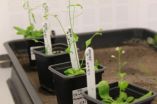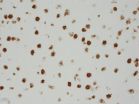(Press-News.org) In the first study of its kind, research undertaken at the University of Southampton has cast significant doubt over the use of biochar to alleviate climate change.
Biochar is produced when wood is combusted at high temperatures to make bio-oil and has been proposed as a method of geoengineering. When buried in the soil, this carbon rich substance could potentially lock-up carbon and reduced greenhouse gas emissions. The global potential of biochar is considered to be large, with up to 12 percent of emissions reduced by biochar soil application.
Many previous reports have shown that biochar can also stimulate crop growth and yield, providing a valuable co-benefit when the soil is treated with biochar, but the mechanism enabling this to happen is unknown.
Professor Gail Taylor, Director of Research at the University's Centre for Biological Sciences and research colleagues, in collaboration with National Research Council (CNR) scientists in Italy and The James Hutton Institute in Scotland, have provided an explanation why biochar has this impact. They have published their findings in the journal Global Change Biology Bioenergy.
They found that when thale cress and lettuce plants were subjected to increasing amounts of biochar mixed with soil, using the equivalent of up to 50 tonnes per hectare per year, if applied in the field, plant growth was stimulated by over 100 percent. For the first time, the response of more than 10,000 genes was followed simultaneously, which identified brassinosteroids and auxins and their signalling molecules as key to the growth stimulation observed in biochar. Brassinosteroids and auxins are two growth promoting plant hormones and the study goes further in showing that their signalling molecules were also stimulated by biochar application.
However, the positive impacts of biochar were coupled with negative findings for a suite of genes that are known to determine the ability of a plant to withstand attack from pests and pathogens. These defence genes were consistently reduced following biochar application to the soil, for example jasmonic and salcyclic acid and ethylene, suggesting that crops grown on biochar may be more susceptible to attack by pests and pathogens.
This was a surprising finding and suggests that if reproduced in the field at larger scales, could have wide implications for the use of biochar on commercial crops.
Professor Taylor, who co-ordinated the research, says: "Our findings provide the very first insight into how biochar stimulates plant growth – we now know that cell expansion is stimulated in roots and leaves alike and this appears to be the consequence of a complex signalling network that is focussed around two plant growth hormones. However, the finding for plant defence genes was entirely unpredicted and could have serious consequences for the commercial development and deployment of biochar in future. Any risk to agriculture is likely to prevent wide scale use of biochar and we now need to see which pest and pathogens are sensitive to the gene expression changes."
INFORMATION: END
New study finds biochar stimulates more plant growth but less plant defense
2014-03-31
ELSE PRESS RELEASES FROM THIS DATE:
Major breakthrough in stem cell manufacturing technology
2014-03-31
Scientists at The University of Nottingham have developed a new substance which could simplify the manufacture of cell therapy in the pioneering world of regenerative medicine.
Cell therapy is an exciting and rapidly developing area of medicine in which stem cells have the potential to repair human tissue and maintain organ function in chronic disease and age-related illnesses. But a major problem with translating current successful research into actual products and treatments is how to mass-produce such a complex living material.
There are two distinct phases in the ...
Wen Dan Tang improves insomnia-related anxiety
2014-03-31
Ghrelin, a brain-gut peptide that induces anxiety and other abnormal emotions, contributes to the effects of insomnia on emotional behavior. In contrast, the traditional Chinese Medicine remedy Wen Dan Tang reduces insomnia-related anxiety, which may perhaps correspond to changes in the brain-gut axis. This suggests a possible relationship between Wen Dan Tang's pharmacological mechanism and the brain-gut axis. Based on this hypothesis, a research team from Beijing University of Chinese Medicine in China generated a sleep deprivation rat model, and orally administered Wen ...
A breakthrough in creating invisibility cloaks, stealth technology
2014-03-31
Controlling and bending light around an object so it appears invisible to the naked eye is the theory behind fictional invisibility cloaks.
It may seem easy in Hollywood movies, but is hard to create in real life because no material in nature has the properties necessary to bend light in such a way. Scientists have managed to create artificial nanostructures that can do the job, called metamaterials. But the challenge has been making enough of the material to turn science fiction into a practical reality.
The work of Debashis Chanda at the University of Central Florida, ...
Early rehabilitation improves postsurgery neurofunctional outcome in spinal tumor children
2014-03-31
In children, primary spinal tumors comprise 4% of all tumors from the central nervous system. Spinal tumors can present with a variety of clinical signs and symptoms in children such as pain followed by motor regression, gait disturbance, sphincter dysfunction, sensory symptoms, torticollis, and kyphoscoliosis. Treatment of spinal tumors is based on tumor type, but surgical resection is the mainstay. Moreover, physical treatment and rehabilitation implementation are necessary in order to minimize the symptoms of the patients and develop present functions. Prof. Nezire Kose ...
A new study shows that even micro heart attacks are a major problem
2014-03-31
MINNEAPOLIS, MN – March 29, 2014 – Researchers at the Minneapolis Heart Institute at Abbott Northwestern Hospital have found that cardiac magnetic resonance (CMR) imaging may help doctors better identify which patients with mild heart disease are likely to develop more serious heart problems long term. CMR imaging provides supporting information to guide treatment decisions and help doctors provide targeted care for patients at highest risk. The research, led by Minneapolis Heart Institute Foundation Research Fellow Naohiko Nemoto, MD, will be presented at the American ...
Young women: Eat more fruits and vegetables now to protect your heart later
2014-03-31
MINNEAPOLIS, MN – March 29, 2014 – A diet rich in fruits and vegetables for middle-aged adults has been associated with reduced rates of coronary heart disease (CHD), especially in women. Now, research supported by the Minneapolis Heart Institute Foundation (MHIF) shows that for women, what you eat in your 20s may be just as important for your middle-aged heart. The results of the study, aimed at examining the extent to which young adults' diets are linked to cardiovascular health later in life, will be presented at the American College of Cardiology (ACC) meeting in Washington, ...
Fewer deaths with self-expanding TAVR versus surgery at 1 year
2014-03-31
WASHINGTON (March 29, 2014) — Transcatheter aortic valve replacement with a self-expanding valve prosthesis for the first time has demonstrated significantly lower death rates at one year compared with conventional surgical valve replacement in high-risk patients with severe aortic stenosis, according to research presented at the American College of Cardiology's 63rd Annual Scientific Session.
Worldwide, an estimated 300,000 people have severe aortic stenosis – a faulty valve in the main artery carrying blood out of the heart – and roughly a third of them are deemed unable ...
Renal denervation shows no benefit in resistant hypertension
2014-03-31
WASHINGTON (March 29, 2014) — Renal denervation fell short of primary and secondary efficacy goals in patients with severe resistant hypertension but did meet the primary safety endpoints, according to keenly awaited data from SYMPLICITY HTN-3 presented at the American College of Cardiology's 63rd Annual Scientific Session. This pivotal trial is the largest study conducted of renal artery denervation as a treatment for resistant hypertension and the most rigorously designed, including blinding and a sham treatment in the control arm.
Hypertension increases risks for heart ...
Efforts to curb hospital readmissions take center stage
2014-03-31
WASHINGTON (March 29, 2014) — Strategies aimed at reducing the number of patients with heart failure and other cardiovascular conditions who find themselves back in the hospital after discharge were identified in six new studies presented at the American College of Cardiology's 63rd Annual Scientific Session.
One out of five Medicare patients with heart failure is readmitted to the hospital within just one month of discharge, a fact that is not only bad news for patients who would most likely prefer to avoid another hospital stay, but it also places intense economic pressures ...
Primary cardiovascular disease prevention is leaving the office
2014-03-31
MINNEAPOLIS, MN – March 30, 2014 – Early results from HeartBeat Connections, a telemedicine program supported by the Minneapolis Heart Institute Foundation (MHIF), suggest effective primary prevention for cardiovascular disease (CVD) may be achieved with a team-based approach that integrates office visits with supplemental phone coaching. HeartBeat Connections provides dietitian- and nurse-led coaching over the phone to adults at high risk for CVD, with the goal of helping to improve and control key CVD risk factors. Gretchen Benson, RD, CDE, Healthcare Systems Integration ...


